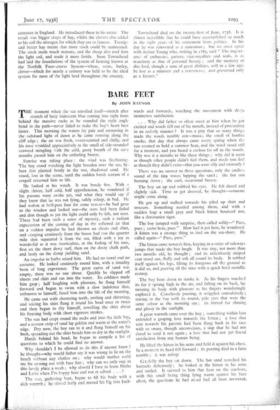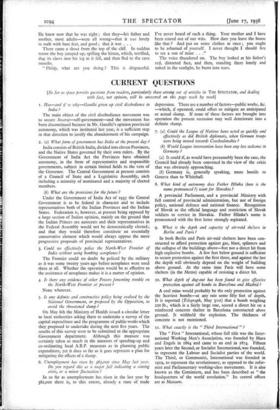BARE FEET
By JOHN RAYNOR
THE moment when the sea unrolled itself—stretch after stretch of hazy iridescent blue coming into sight from behind the massive rocks as he rounded the right angle bend in the path—never failed to make the boy's heart beat faster. This morning the waters lay pale and unmoving in the subdued light of dawn as he came running along the cliff edge ; the air was fresh, sweet-scented and chilly, and his nose wrinkled appreciatively as the smell of tide-stranded seaweed mingling with the cold, gusty breath of the care mouths passed him on the unfurling breeze.
Sunrise was taking place : the wind was freshening. The boy stood watching the light broaden over the sea, his bare feet planted firmly in the wet, shadowed sand. He stood, lost in the scene, until the sudden harsh scream of a seagull returned him to life.
He looked at his watch. It was barely five. With a slight shiver, half cold, half apprehension, he wondered if his parents were awake yet, and what they would say if they knew that he was not lying, safely asleep, in bed. He had woken at half-past four for some reason—he had gone to the window and looked out—the stars had been faded and dim though as yet the light could only be felt, not seen. There had been such a sense of mystery, such a radiant expectation of the coming of day in the softened air that on a sudden impulse he had thrown on shorts and shirt, and creeping cautiously from the house had run the quarter mile that separated it from the sea, filled with a joy as wonderful as it was inarticulate, at the feeling of his toes, first on the short dewy turf, then on the dusty chalk path, and lastly on the damp yielding sand.
An impulse to bathe seized him. He had no towel and no costume. He looked cautiously round him, with a timidity born of long experience. The great curve of sand was empty, there was no one about. Quickly he slipped off shorts and shirt and ran into the water. Its coldness made him gasp ; half laughing with pleasure, he flung himself forward and began to swim with a slow indolence that, unknown to himself, fused him into the life of the morning.
He came out with chattering teeth, smiling and shivering, and seizing his shirt flung it round his head once or twice and then began to dry himself, towelling the shirt about his freezing body with short vigorous strokes.
The sun had crept round the rocks and into the little bay, and a narrow strip of sand lay golden and warm at the water's edge. Dry now, the boy ran to it and flung himself on his back, spreading out the shirt beside him to dry in the sunlight. Hands behind his head, he began to compile a list of questions to which he could find no answer.
Why shouldn't I be allowed to do this if anyone knew ? he thought—why would father say it was wrong to lie on the beach without any clothes on ; why would mother scold me for coming out with bare feet ; why can we only stay in this lovely place a week ; why should I have to learn Maths and Latin when I'm happy here and not at school . . . ?
The sun, gathering heat, began to fill his body with a rich warmth ; he stirred lazily and moved his big tees back- wards and forwards, watching the movement with deep, instinctive satisfaction.
. . . Why did father so often sneer at him when he got excited and words fell out of his mouth, instead of proceeding in an orderly manner ? It was a pity that so many things made the words tumble out—music, the smell of bonfire smoke, that day that always came every spring when thz sun seemed to hold a summer heat, and the wind stood still for a moment, and you heard a cuckoo far off in the woods. Why was it a mistake to like these things ; why did it seem as though other people didn't feel them, and made you feel as though they didn't exist—that you were silly and unmanly ?
There was no answer to these questions, only the endless sound of the tiny waves lapping the sand ; the hot sun burning down ; the cool, occasional breeze.
The boy sat up and rubbed his eyes. He felt dazed and slightly sick. Time to get dressed, he thought—someone might come along.
He got up and walked towards his piled up shirt and trousers. Something rustled among them, and with a sudden leap a small grey and black kitten bounced out, like a diminutive tiger.
The boy jumped with surprise, then called softly—" Puss, puss ; come here, puss." How had it got here, he wondered. A kitten was a strange thing to find on the sea-shore. He called again—" Puss, puss."
The kitten came towards him, leaping in a series of sideways - jumps that made the boy laugh. It was tiny, not more than two months old, he thought ; and its ridiculously striped coat stood out, fluffy and soft all round its body. It rubbed itself against his legs, lifting its forepaws off tha ground as it did so, and purring all the time with a quick hard metallic ecstasy.
The boy bent down to stroke it. As his fingers touched its fur it sprang high in the air, and falling on its back, lay twisting its body with pleasure as his fingers wonderingly explored it. Ceaselessly purring, it wriggled convulsively ; staring at the boy with its round, pale eyes that were the same colour as the morning sea ; its barred fur shining and glossy in the sunlight.
A great warmth came over the boy ; something within him extended a groping love towards the kitten ; a love that sent towards his parents had been flung back in his face with so smart, though unconscious, a slap that he had not dared to send it out again ; a love that had not yet found satisfaction from any human being.
He lifted the kitten in his arms and held it against his chest. In a moment its head fell forward ; its purring died to a faint rumble ; it was asleep.
r:fully the boy sat down. The hot sand scorched his buttocks deliciously ; he looked at the kitten in his arms and smiled. It seemed to him that here on the seashore, with this small living thing lying warm against his bare chest, the questions he had asi:ed had all been answered. He knew now that he was right ; that they—his father and mother, most adults—were all wrong—that it was lovely to walk with bare feet, and good ; that it was . . .
There came a shout from the top of the cliff. In sudden terror the boy jumped up, spilling the kitten, which, terrified, dug its claws into his leg as it fell, and then fled to the cave mouths.
" Philip, what are you doing ? This is disgraceful. I've never heard of such a thing. Your mother and I have been scared out of our wits. How dare you leave the house like that ? And put on some clothes at once ; you ought to be ashamed of yourself. I never thought I should live to see a son of mine . . ."
The voice thundered on. The boy looked at his father's red, distorted face, and then, standing there lonely and naked in the sunlight, he burst into tears.



















































 Previous page
Previous page